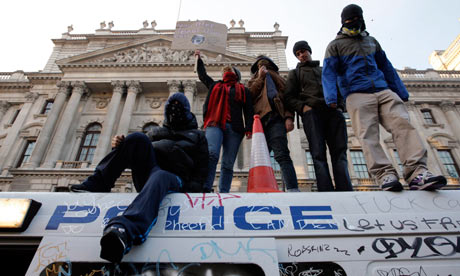


Student protest largely peaceful despite the images
Many of those on the London demonstration appeared uncomfortable with the violence of a few

It was just after 1pm today that police van 313C, parked on Parliament Street in cental London, became the sudden, angry focus of youthful opposition to the government's plans to charge students significantly more for their education.
The vehicle, unoccupied and stranded amid a sea of mainly teenage protesters, was set upon. Within minutes the windows were smashed and the sides covered in graffiti, as protesters danced on the roof.
While those images – captured by a scrum of TV crews and photographers – will surely become a symbol of the second bout of mass student unrest in a fortnight, the violence was not supported by many of the estimated 4,000 protesters contained by a police cordon, known as a kettle, in Whitehall.
"All these kids just hate the police and they see it as an excuse for violence," said Zoe Williams, an art student who, at 19, was one of the older protesters in the crowd. She was also among those who tried in vain to hold back the activists, many of them masked, who were intent on turning an unruly but largely peaceful demonstration violent.
"We're going to be portrayed badly in the media," she shouted at them. "We're just wrecking a police van."
Later police began to let protesters through their cordons. Police horses charged at one group of students as they emerged, causing panic with reports of one teenager being trampled. It was not known what prompted the charge.
Despite the vivid scenes, as the protest wound down tonight Scotland Yard said it had arrested just 15 people for alleged offences including violent disorder and criminal damage. Two officers were injured, one suffering a broken arm and the other being knocked unconscious. Ambulance crews said they treated eight people, none of them seriously hurt.
The demonstration began when students marched toward Trafalgar Square from schools, further education colleges and universities across the capital. The crowd was markedly younger than at the demonstration two weeks ago, comprising mainly school pupils and teenagers.
Separately, other activists took over university buildings around the capital. Student leaders said at least six universities had been occupied, with several more sit-ins planned.
"I want to go and do a degree in forensic science at university but I don't think I will be able to because of the debt," said Melesha Cartswell, 16, outside Kingsway further education college. "I feel really guilty asking my mum for any money because it is not fair on her so I will have to do something else if they scrap the grant."
Soon after converging under Nelson's Column around mid-day, the crowd headed along Whitehall, toward parliament. They were met by lines of riot police, who closed-off the road and surrounded the protest.
Police blocked off exits and appeared determined to contain the crowd, mindful of scenes a fortnight ago when activists broke through lines of officers to storm the Thames-side Conservative headquarters at Millbank, resulting in 60 arrests. An estimated 800 officers were deployed, as opposed to the 250 on duty to police 50,000 students on November 10.
By early this evening it appeared that the violence near the government buildings of Whitehall had been considerably less than that seen two weeks ago. A bus shelter was smashed, missiles had been hurled at police and dozens of students scaled traffic lights and walls.
In the worst skirmishes, protesters used metal construction fences to ram police amid repeated attempts to break through lines. One injured officer could be seen being dragged clear by a colleague.
It was clear that many in the crowd were uncomfortable with such tactics – fights also broke out as some protesters chanted, "Stop that shit".
Nearby, one young man with a scarf around his face climbed on to a wall near the Cabinet War Rooms and scrawled "Revolution" in large, red letters.
"We are angry because Cameron ain't listening to us but now he will have to," said Darius Clarke, 17, an A-level student from Camden, north London, who was watching from the crowd. "This is the first thing like this I have been on but it's not the last because it is our future that is at stake."
As night fell and the temperature dropped, close to freezing protesters still barricaded inside the kettle resigned themselves to the wait to get out, gathering around impromptu campfires as portable sound systems pounded out music. A few even read textbooks by the light of the flames. The largely peaceful mood was improved when police brought in portable toilets and distributed water, the lack of which prompted criticism at some previous protests after large crowds were penned in for hours.
For many of the younger participants the day proved a sudden and steep introduction to the many moral complexities of civil disobedience.
As dusk fell, around 20 year 11 pupils, who had walked out of Graveney School in Tooting, south London, perched themselves on a mechanical digger alongside roadworks on Whitehall to discuss the efficacy, or otherwise, of violence.
None had broken the law but some still felt the unrest would give their cause the attention it deserved. "I wouldn't do it myself, but what else can people do to get the government to respond that they will not cut fees?" said Sahand Fouladiasl, 16.
His friend Kayani Kayani, also 16, disagreed with violence, but said the protest was nonetheless a valid cause: "I think my father would approve of me being here. He values education highly and constantly tells me that, if I want to put my opinion forward, I need to be well-educated. This is about getting an education."